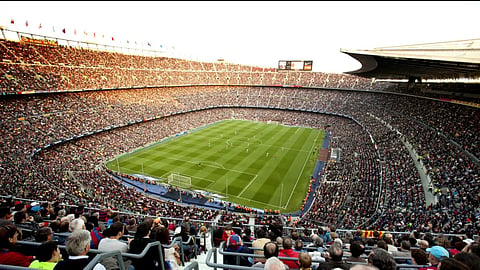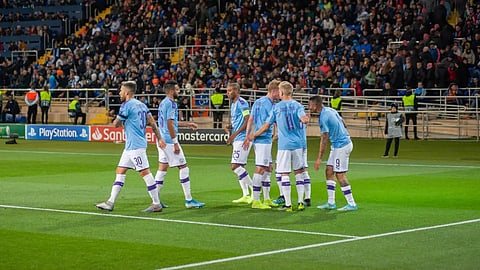A dribble, a run, a sublime touch, and a goal…and a stadium raptured in a heady mix of euphoria, agony and grief. All the drama, the excitement, over in mere 90 minutes of pure adrenalin rush. Add another 30 minutes of extra time or penalty shootouts if the result remains undecided within the stipulated game time. There are few sports that can match up to the excitement of a football game. But now, Gen-Z seem to have a problem with it, or sport to be precise, according to a number of surveys across nations.
Football Clubs Try To Win Back Gen Z's Interest With Metaverse And NFTs
Millennials find no beauty in experiencing ‘Beautiful Game’ on field, survey reveals interactive content key to increasing engagement in virtual world.

A survey by Morning Consult revealed that Generations Z Americans (people born between 1997 and 2009) are about half as likely as millennials to watch live sports events in the US.
Another study by Samford University showed similar results for Germany, too, notwithstanding the fact that the country is a football powerhouse with a top-class domestic football league, the Bundesliga, and is also a four-time FIFA World Cup champion.
According to the study, Gen-Z Germans are less likely than older generations to watch an entire football match; instead, they would rather prefer to view highlight summaries on YouTube and Instagram. This is because they are more accustomed to online social apps and technologies, and prefer everything to happen at a faster pace.
A survey by Nielsen revealed the probable causes as well as the solution for this. According to it, Gen-Z’s attention span is not shorter; instead, if the content is engaging enough, and if it provides a regular interactive opportunity, they will spend hours on it.
Football clubs are now, thus, keenly exploring opportunities with metaverse and investing heavily to build virtual 3D experiences, metaverses, and NFTs. All this is aimed at providing their fans with an interactive and engaging football experience by creating a metaverse world.
Here are three ways in which football clubs think metaverse experience can attract the Gen Z.
1. Fan Engagement: This is the number one reason why football clubs around the globe are either thinking of going into the metaverse world or have already done so. Football has been a source of entertainment for long, but lately, the younger population has been moving away from it.
As such, these football sports clubs need to engage different generations of fans according to their preferred medium if they want to stay relevant. Gen-Z grew up among technology and the digital world, so they are more comfortable in emerging tech like virtual reality, metaverse, NFT, and others. Football clubs hope to capitalise on this and keep their fan engagement high.
“As the metaverse becomes more and more a reality, these fans will be more immersed in virtual spaces. Thus, it’s time for sports organisations to think of their brand and IP presence within such virtual environments. For example, clubs could build virtual museums to illustrate their history, their commercial partners could actually see what their branding would look like on the screens in the stadium, and virtual stores could allow buyers to see how they would look in certain items of their merchandise kit,” says Dhwani Mehta, chief of staff, NFT Labs Inc., and a member of Blockchain and Crypto Assets Council (BACC).

2. E-Sports: E-sports is another exciting area wherein participants play for a prize using licensed real football players from clubs across the globe. In India, 17 million people watched at least one e-sports tournament in the financial year 2021, according to a research paper published in Statista. This figure is 240 million globally.
Football clubs hope to leverage on this phenomenon and take it further by using metaverse, virtual reality and augmented reality technologies. Fans and players could interact with 3D player models in real time, and also have an interactive e-sports experience. Decentralised gaming is hoped to play a more significant role here.
Says Pratik Gauri, founder and CEO of 5ire.org, a sustainable blockchain company: “The sports industry in general, and football, in particular, are primed to take advantage of the metaverse technology. For football, the teams could use the digital universe to engage new and existing fans and open up brand new revenue streams in innovative ways.”
He adds: “For example, teams could offer fans the kinds of virtual experiences and rewards that can only be delivered within a virtual world. According to statistics, an estimated 42,000 attendees participate in live e-sports events in the UK. The rising live streaming of games and increasing infrastructure for the league tournaments are key factors driving the market growth.”
3. Showcase: Globally, every football club has a rich heritage and diversified achievements, and their fans are pretty proud about it. Birmingham City FC has 147 years of rich heritage, during which they have made lot of significant achievements. Like them, other football clubs worldwide, too, have such rich heritage that they would now like to share with younger people in the metaverse world. They are building virtual museums using metaverse technology to re-create their historical moments for newer fans to understand more about it. Not only that, but football clubs are also conducting virtual tours and behind the scenes operations for all types of fans.

For instance, a differently-abled fan of a football club may find it difficult to go to Manchester and watch Man City FC play. But he can now, thanks to virtual metaverse Etihad Stadium being replicated here.
“This metaverse project underlines Birmingham City’s commitment to innovation, and we’re thrilled to be one of the front-runners and early adopters of Web 3.0,” said James Corrigan, commercial sales manager of Birmingham City Fc in a press release.